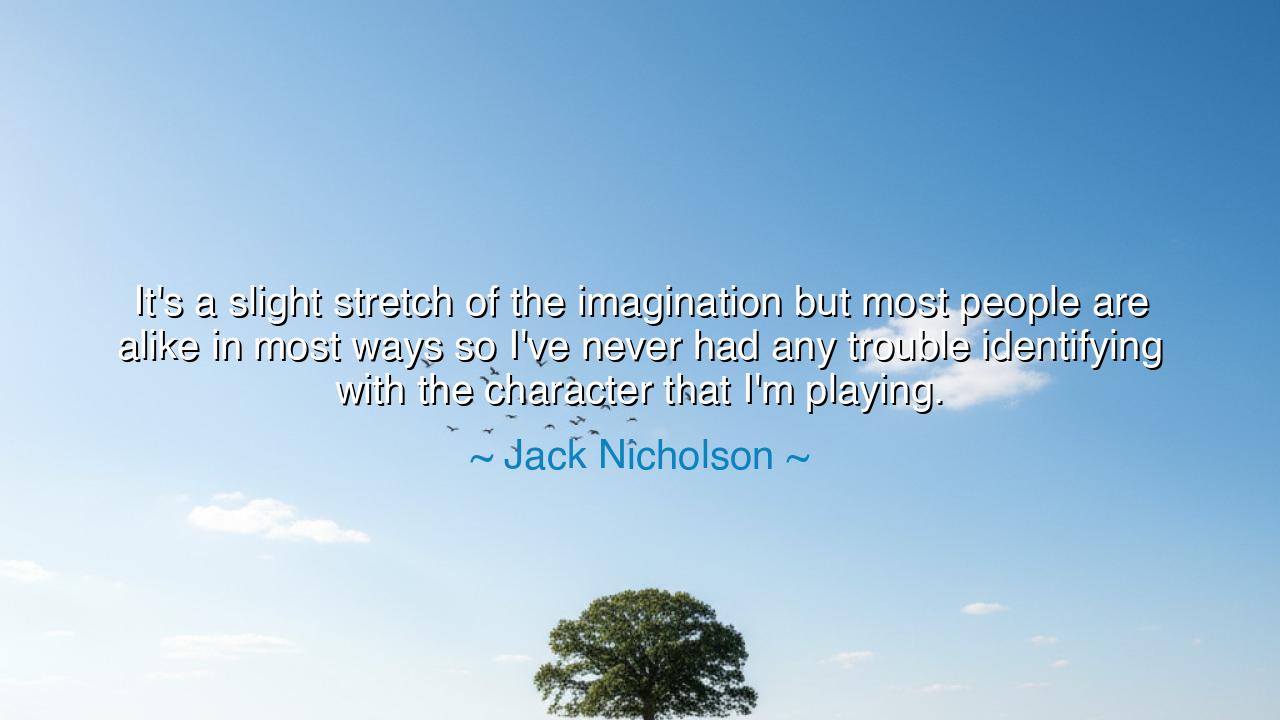
It's a slight stretch of the imagination but most people are
It's a slight stretch of the imagination but most people are alike in most ways so I've never had any trouble identifying with the character that I'm playing.






“It’s a slight stretch of the imagination but most people are alike in most ways, so I’ve never had any trouble identifying with the character that I’m playing.” Thus spoke Jack Nicholson, the enigmatic master of the screen — a man whose presence has stirred laughter, fear, and awe in equal measure. Beneath this simple statement lies a profound truth about the human spirit and the power of imagination: that every soul, no matter how different in circumstance or destiny, shares the same roots of emotion. In his words, Nicholson reveals the secret of the artist — to find the universal within the particular, to reach into the depths of the self and discover, there, the essence of all mankind.
For what is acting, if not the sacred art of identification — of walking in another’s skin, feeling another’s sorrow, burning with another’s fire? Nicholson reminds us that this is not achieved by pretense or deceit, but by empathy, by the courage to see oneself in others. The imagination, though it may “stretch” to inhabit a murderer, a king, or a madman, does not truly leave home; it only expands the borders of understanding. Beneath every mask, the actor finds the same beating heart. So too, in life, when we look beyond the surface of others — beyond their masks, fears, and failures — we find reflections of ourselves.
This insight is not new, but ancient as wisdom itself. The philosopher Marcus Aurelius, emperor of Rome, wrote that all men share the same reason, the same nature, the same inner flame. To despise another is to despise a part of oneself. Nicholson, though he speaks not as a philosopher but as an artist, carries this same truth in his craft. Whether he portrays the lunatic rage of Jack Torrance in The Shining, the wounded cynicism of Melvin Udall in As Good As It Gets, or the reckless passion of Randle McMurphy in One Flew Over the Cuckoo’s Nest, he finds within himself the seed of those souls. He teaches us that imagination, guided by empathy, bridges the chasm between the self and the other.
Consider also the example of Meryl Streep, whose mastery of transformation rests not on imitation but on recognition. When she becomes Margaret Thatcher, or Sophie Zawistowski, she does not conjure them from thin air — she uncovers within herself the ambition, the fear, the tenderness that lives in every human being. She confirms Nicholson’s truth: that to embody another person is to touch the shared substance of humanity. Imagination, then, is not an act of distance but of union — it stretches, yes, but always toward connection.
In this light, Nicholson’s “slight stretch of the imagination” becomes a metaphor for the artist’s — and indeed, the human being’s — capacity for compassion. To stretch the imagination is to extend the heart. It is the soul’s way of saying, “I, too, could be this person. I, too, could have walked this path.” And when one sees that “most people are alike in most ways,” life itself becomes a grand play of mirrored experiences: every joy echoes another, every sorrow is shared. Such understanding is the root of forgiveness, of love, of peace.
But beware, for in the age of pride and division, this truth is easily forgotten. Many confine themselves within narrow walls of identity and judgment, unable to imagine the lives of others. They see only difference and call it destiny. Yet the wise, like Nicholson, know that imagination is not only the artist’s gift but the healer of souls. It is through this imaginative empathy that societies mend, that strangers become brothers, and that the world begins again to breathe in harmony.
So take this as your teaching, O seeker: Stretch your imagination, not merely for art, but for life. When you meet another, look with the eyes of the actor and the heart of the poet. Ask not, “How am I different?” but “Where do we meet in spirit?” For you are never far from another’s story — you live it, unknowingly, in your own. Imagination is the bridge, and empathy is the path. Walk it, and you will find the common fire that burns in all.
Thus, the wisdom of Jack Nicholson stands revealed: that the heart of art is the heart of humanity. Whether on the stage or in the street, the same truth holds — that imagination binds us, and through it, we understand that all lives are but variations of our own. When we stretch our imagination toward others, we do not lose ourselves; we find the greater self — the vast and eternal soul of humankind.






AAdministratorAdministrator
Welcome, honored guests. Please leave a comment, we will respond soon